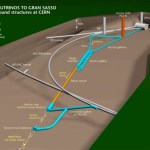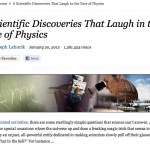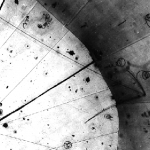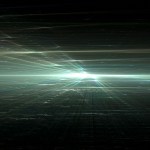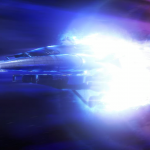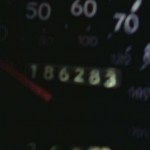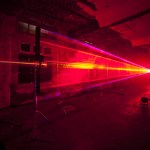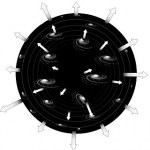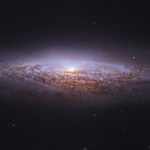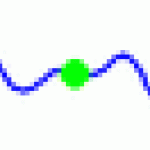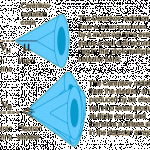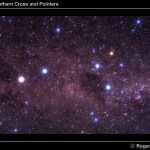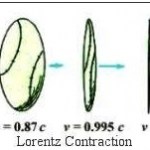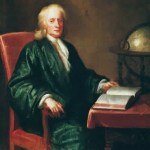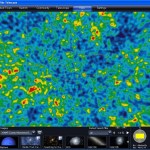Relativity
"I have difficulty to believe it, because nothing in Italy arrives ahead of time."
-Sergio Bertolucci, research director at CERN, on faster-than-light neutrinos
You know the story. Last year, the OPERA experiment at CERN announced, to the shock and surprise of practically everyone, that they had observed what appeared to be neutrinos moving faster than the speed of light.
How did the experiment conclude this? Let's refresh your memory.
Image credit: OPERA collaboration; T. Adam et al.
A beam of high-energy protons, moving very close to the speed of light (but not quite there thanks to…
"In science, "fact" can only mean "confirmed to such a degree that it would be perverse to withhold provisional assent." I suppose that apples might start to rise tomorrow, but the possibility does not merit equal time in physics classrooms." -Stephen Jay Gould
Those of you who follow me on either google+, facebook or twitter know that I sometimes post interesting articles about science from around the world, including this very good article about myths about outer space, from the often-entertaining cracked.com. So, as you can imagine, I was (at first) very excited when I saw this article…
"This is to show the world that I can paint like Titian: [See drawing, above.] Only technical details are missing." -Wolfgang Pauli
First theorized by Pauli all the way back in 1930, neutrinos are some of the most mysterious and puzzling particles ever discovered in nature. For starters, they weren't even first detected until 1956 (by Reines and Cowan), 26 years after they were predicted to exist! Coming in three flavors -- electron, muon and tau -- and in both particle and anti-particle type, these neutrinos have the smallest but non-zero masses of any particle ever discovered.
Image…
"Alas! must it ever be so?
Do we stand in our own light, wherever we go,
And fight our own shadows forever?" -Edward Bulwer-Lytton
Ever since it was conjectured that the speed of light was the ultimate speed limit of the Universe, we have tried -- with the most powerful of our tools -- to push as close to it as possible.
Image credit: Sven Geier, retrieved from Alpha Centauri.
And we know the speed of light in vacuum -- in perfectly, completely empty space -- exactly: 299,792,458 meters-per-second. That's what we refer to as c, or more casually, the speed of light. And that's really exact,…
The The Manga Guide to Relativity might come in especially handy these days, what with faster than light neutrinos, Republican candidates and other science-defying entities zooming around. And, it is one of those Japanese anime things, which makes it cool. This is a story set in Tagai Academy summer's school session, where the "plucky" Miss Uraga teaches the kids relativity.
When you have finished reading this book you will be able to calculate the effects of time dilation, explain the Twin Paradox, understand Einsteinium famous E=mc2 and get a job at CERN.
Hideo Nitta, is in the…
Q: "Why don't physicists shield themselves from neutrinos?"
A: "Because they never see them coming." #neutrinojokes
Over the past two months, we've talked more about neutrinos than ever before thanks to an extraordinary claim that neutrinos have been observed to move faster-than-light!
And as you well know, no particle is allowed to travel through spacetime faster than the speed of light in vacuum, no matter how much energy you put into it!
(Unless, that is, you count what happens in video games.)
Here's a brief refresher for you as to what's been going on. CERN, the home of the world's most…
"Events often move faster than our ability to comprehend them." -Lee H. Hamilton
But sometimes, going ever faster is where all the fun is at. Have a listen to the Stray Cats, from their debut album, as they plow through their title track,
Built For Speed.Well, believe it or not, I think my car just became a neutrino! Why's that? See for yourself!
(For those of you who need a little help, remember that the USA does distances in miles.)
Of course, I had to push it just a little bit more to become an OPERA neutrino...
so if you see that Cohen-Glashow radiation out there on the highway, don't…
"Where there is no patrol car, there is no speed limit." -Peter Beckmann
You've of course heard the news that the OPERA collaboration in Italy has measured what appears to be neutrinos moving faster than the speed of light.
Image credit: Raoul Pop.
The way they did it was pretty straightforward. Shoot a pulse of protons moving at ultra-high energies -- at speeds indistinguishable from the speed of light -- into a fixed target.
Image credit: The OPERA collaboration's recent preprint.
They'll produce all sorts of high energy particles: baryons, mesons, electrons, positrons, muons, and more…
"If my theory of relativity is proven successful, Germany will claim me as a German and France will declare that I am a citizen of the world. Should my theory prove untrue, France will say that I am a German and Germany will declare that I am a Jew." -Albert Einstein
One of the most famous scientific developments in the 20th century was the revelation that the Universe had a speed limit: the speed of light.
Image credit: United Visual Artists / Tom Oldham.
Clocking in at exactly 299,792,458 m/s, Einstein's theory of relativity states that any particle with mass can only approach -- but can…
Last month, a team of researchers announced that their neutrinos appeared to be travelling faster than the speed of light. Ethan Siegel explains that the mass of a neutrino is "less than one-millionth the mass of the electron, but still not equal to zero" and "should move at a speed indistinguishable from the speed of light." Meanwhile the OPERA team had to smash 1020 protons just to detect 16,000 neutrinos—and account for every source of delay an uncertainty in their experimental setup. On Uncertain Principles, Chad Orzel explains that the researchers used GPS satellites to measure the…
"The only reason for time is so that everything doesn't happen at once." -Albert Einstein
Now that you know how many galaxies are in our expanding Universe, you might be wondering about their speeds.
After all, since the Universe is expanding, that means that the farther away a galaxy is from us, the faster it's speeding away from us.
Graph credit: Michael Rowan-Robinson.
What's more than that, since the expansion itself is accelerating, galaxies speed away from us ever faster as time progresses.
It should come as no surprise, then, that galaxies that we see moving away from us at high…
"The best way to escape from a problem is to solve it." -Alan Saporta
One of the greatest puzzles in the Universe today is just why the Universe is structured the way it is.
Image credit: Robert Gendler / Hubble Legacy Archive.
For the individual galaxies that we see, the puzzle is why they rotate at the speeds they do. If the only matter in these galaxies were normal matter (made out of protons, neutrons, electrons, etc.), the outskirts of these galaxies would rotate around their centers much more slowly than they actually do.
Image credit: Victor Andersen, University of Alabama, KPNO,…
"The first principle is that you must not fool yourself--and you are the easiest person to fool. So you have to be very careful about that. After you've not fooled yourself, it's easy not to fool other scientists. You just have to be honest in a conventional way after that." -Richard Feynman
Last week, a collaboration of 160 scientists working in Italy wrote a paper claiming that their experiment shows neutrinos traveling faster than the speed of light. Although I wrote up some initial thoughts on the matter, and there are plenty of other excellent takes, we're ready to go into even deeper…
"Nothing travels faster than light, with the possible exception of bad news, which follows its own rules." -Douglas Adams
My inbox is on fire today with messages about this story about neutrinos breaking the speed of light:
What's going on here? A group (a large group, mind you) of physicists known as the OPERA collaboration have made a neutrino beam, and have been studying it for the past few years.
Making a neutrino beam is the easiest type of beam to make, by the way. All you do is shoot a bunch of high-energy particles into the Earth, like so.
Image credit: CERN Neutrinos to Gran Sasso…
A scientific theory hasn't really arrived until the cynical and unscrupulous find a way to use it to extract money from the credulous and gullible. This has posed a significant obstacle for general relativity, dealing as it does with gravity, which requires really gigantic masses to produce measurable effects. That makes it a little difficult to sell wacky general relativity-based schemes to people.
Until now, anyway-- recent advances in atomic clocks have made it possible to see relativistic effects on a human scale. There was a really nice talk on this experiment in the fundamental symmetry…
"The very closest stars would require many years to visit, even traveling at the speed of light, which is impossible according to Einstein's theory of relativity. Today's fastest spaceships would require 200,000 years to travel to Alpha Centauri, our closest bright star. The energy required to send a hundred colonists to another star, as Frank Drake has pointed out, would be enough to meet the energy needs of the entire United States over a human lifetime. And these estimates are regarding nearby stars. When we consider the distances across the entire galaxy, and between galaxies,…
"There is also an amplitude for light to go faster (or slower) than the conventional speed of light. You found out... that light doesn't go only in straight lines; now, you find out that it doesn't go only at the speed of light! It may surprise you that there is an amplitude for a photon to go at speeds faster or slower than the conventional speed, c." -Richard Feynman
You've been around the block a few times, and you know how it goes when you try to go faster and faster. Everything works just like you expect, until you start getting close to the speed of light, c. And then, all sorts of…
"If I have ever made any valuable discoveries, it has been due more to patient attention, than to any other talent." -Isaac Newton
Born the year Galileo died, Isaac Newton is one of the most revered figures in all of physics.
In addition to the work he did on optics, planetary motion and gravitation, Newton is also famous for his three laws of motion, which -- even today -- apply very well to every particle in the Universe. They are:
Law #1: An object at rest will remain at rest, and an object in motion will remain in motion, unless acted upon by an outside force.
What does this mean? It…
Sean Carroll and Brad DeLong have each recently asserted that relativity is easier to understand than quantum mechanics. Both quote Feynman saying that nobody understands quantum mechanics, but Sean gives more detail:
"Hardness" is not a property that inheres in a theory itself; it's a statement about the relationship between the theory and the human beings trying to understand it. Quantum mechanics and relativity both seem hard because they feature phenomena that are outside the everyday understanding we grow up with. But for relativity, it's really just a matter of re-arranging the concepts…
"What do we mean by setting a man free? You cannot free a man who dwells in a desert and is an unfeeling brute. There is no liberty except the liberty of some one making his way towards something. Such a man can be set free if you will teach him the meaning of thirst, and how to trace a path to a well. Only then will he embark upon a course of action that will not be without significance. You could not liberate a stone if there were no law of gravity -- for where will the stone go, once it is quarried?" -Antoine de Saint-Exupery
Gravity, on the largest scales, rules everything in the Universe…
